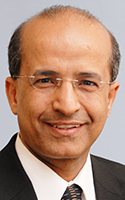By Ernst Lamothe Jr.

The numbers are scary. For those who are diagnosed with late stage colon cancer, the five-year survival rate is 12 percent, according to the American Cancer Society. Colorectal cancer starts in the colon or the rectum and begins as growths in the inner lining. The growth — called polyps — can change into cancer over time, but not all polyps become cancer.
This year, more than 145,000 new colon and rectal cancer cases are expected and more than 51,020 will die from the disease. That figure takes on even more weight considering what medical experts have been telling patients for decades.
“Colon cancer is one of the most preventable cancers when dedicated early on because the polyps are precancerous,” said physician Mohamed Alsalahi, director of gastroenterology and endoscopy for Newark-Wayne County Hospital, which is under the umbrella of Rochester Regional Hospital. “We shouldn’t be having the number of people dying from this disease that we do.”
Alsalahi offers five important elements people need to know about colon cancer.
1. Screening
Screening tests can detect colon and rectal cancer at its earliest, most treatable stage. It is important to consult your doctor if you experience issues related to a change in bowel habits, such as diarrhea or constipation, a feeling that your bowel is not emptying completely, or a narrowing of the stool. Other feelings include an enlarged abdomen, weight loss for no know reason, nausea or feeling of bloating. But the five-year survival rate for colon cancer found at the early age is 90 percent, according to the Colon Cancer Alliance. Once a person reaches 50 years of age, most routine, preventable screening colonoscopies are covered with no co-pay under the Patient Protection and Affordable Care.
“If you are 50, you should schedule a colonoscopy immediately,” said Alsalahi. “I know people either let the fear or possible discomfort keep them from going to their physician. But the discomfort of scheduling an appointment [and having a colonoscopy done] is far less painful than having colon cancer.”
2. Pay attention to symptoms
Colorectal cancer is a disease in which abnormal cells in the colon or rectum divide uncontrollably, ultimately forming malignant tumors. Symptoms of colon cancer include rectal bleeding, stomach pain, weakness, weight loss and low red blood cells.
“Early detection does save lives,” said Alsalahi. “If you are 50 and you haven’t had your colonoscopy, you have a much higher rate of getting colon cancer. But when we catch it early, the survival rate skyrockets.”
3. Both genders can be affected
Excluding skin cancers, colorectal cancer is the third most common cancer diagnosed in both men and women in the United States. Both men and women can be diagnosed with colon or rectal cancer. Even more important, colon cancer is the second leading cause of cancer death in the U.S. behind lung cancer.
“I think there are some patients that confuse pancreatic cancer with colon cancer. Men and women both have colons and can have colon cancer,” he added.
4. Family History is Essential
There is no way to know for certain if you will develop colon or rectal cancer, but there are a variety of factors that may increase your risk for these cancers. You are at a higher risk if you are over the age of 50. In addition, the risk of cancer of the colon and rectum increases with age and having a diagnosed family history with a close relative including parents, brothers, sisters, or children.
“When we find out that people have a family history, there are completely different rules. If we find out that their family members had colon cancer as early as 40 years old, then we recommend the other family members get checked as early as 30,” said Alsalahi.
5. Pay attention to risk factors
Smoking contributes to the development of many types of illnesses, including colon cancer. Smokers not only have a higher risk of developing colon cancer, they also have a higher risk of dying from the disease. Both staying in shape and watching potential risk factors is essential to stay ahead of the trend.
“What people don’t know is that you can be incredibly healthy, exercise and have no family history and there is still a 20 to 25 percent chance that we will find polyps,” said Alsalahi. “So just imagine the odds if you are someone who doesn’t work out, smokes and does other unhealthy actions.”
